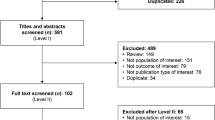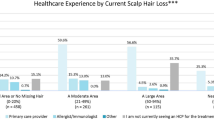Abstract
Objective
Chemotherapy-induced alopecia (CIA) is one of the most common and distressing side effects of chemotherapy treatment. This study aims to assess the illness perceptions of female patients dealing with CIA, and their associations with demographic and clinical characteristics, coping strategies, and quality of life. The secondary aim was to compare the illness perceptions of patients with CIA with other samples, to help elucidate the specific perceptions of patients with CIA.
Method
Forty female patients at risk of severe hair loss due to chemotherapy treatment were included at the oncological daycare unit of a teaching hospital in the Netherlands. Patients were asked to complete the Brief-Illness Perception Questionnaire (B-IPQ) and the Hair Quality of Life (Hair-QoL) questionnaire.
Results
Illness perceptions indicated that although patients understood their hair loss, they lacked being able to make sense of managing it, negatively impacting patients’ lives. Psychological quality of life was significantly correlated with the B-IPQ domains: consequences, degree of concern, and emotional response. Social quality of life was significantly correlated with psychological quality of life. Patients with CIA felt significantly less able to manage their hair loss, compared to patients with breast cancer and psoriatic arthritis.
Conclusion
As patients’ beliefs of being able to manage their hair loss are important for adopting and maintaining adequate coping behaviors, additional effort of health care providers in fostering patients’ sense of control is indicated, focusing on patients’ strengths during and after chemotherapy treatment. In the context of developing interventions for patients with CIA, consequences, concern, and emotional response are the major dimensions that should be taken in account to help patients deal with hair loss.
Similar content being viewed by others
Data availability
The data generated during this study are available from the corresponding author on reasonable request.
References
Dua P, Heiland MF, Kracen AC, Deshields TL (2017) Cancer-related hair loss: a selective review of the alopecia research literature. Psycho-Oncol 26(4):438–443. https://doi.org/10.1002/pon.4039
Haque E et al (2020) Management of chemotherapy-induced alopecia (CIA): a comprehensive review and future directions. Crit Rev Oncol Hematol 156:103093–103093. https://doi.org/10.1016/j.critrevonc.2020.103093
Chon SY, Champion RW, Geddes ER, Rashid RM (2011) Chemotherapy-induced alopecia. J Am Acad Dermatol 67(1):e37–e47. https://doi.org/10.1016/j.jaad.2011.02.026
Kim I-R et al Perception, attitudes, preparedness and experience of chemotherapy-induced alopecia among breast cancer patients: a qualitative study. Asian Pac J Cancer prev 13(4): 1383–1388. https://doi.org/10.7314/apjcp.2012.13.4.1383
Borsellino M, Young MM (2011) Anticipatory coping: taking control of hair loss. Clin J Oncol Nurs 15(3):311–315. https://doi.org/10.1188/11.CJON.311-315
Lemieux J, Maunsell E, Provencher L (2008) Chemotherapy-induced alopecia and effects on quality of life among women with breast cancer: a literature review. Psycho-Oncol 17(4):317–328. https://doi.org/10.1002/pon.1245
Trusson D, Pilnick A (2017) The role of hair loss in cancer identity: perceptions of chemotherapy-induced alopecia among women treated for early-stage breast cancer or ductal carcinoma in situ. Cancer Nurs 40(2):E9–E16. https://doi.org/10.1097/NCC.0000000000000373
Trüeb RM (2010) Chemotherapy-induced alopecia. Curr Opin Support Palliat Care 4(4):281–284. https://doi.org/10.1097/SPC.0b013e3283409280
Choi EK et al (2014) Impact of chemotherapy-induced alopecia distress on body image, psychosocial well-being, and depression in breast cancer patients. Psycho-Oncol 23(10):1103–1110. https://doi.org/10.1002/pon.3531
Yeager CE, Olsen EA (2011) Treatment of chemotherapy-induced alopecia. Dermatol Ther 24(4):432–442. https://doi.org/10.1111/j.1529-8019.2011.01430.x
Leventhal H, Philips LA, Burns E (2016) The Common-Sense Model of Self-Regulation (CSM): a dynamic framework for understanding illness self-management. J Behav Med 39(6):935–946. https://doi.org/10.1007/s10865-016-9782-2
Horne R, Chapman SCE, Parham R, Freemantle N, Forbes A, Cooper V (2013) Understanding patients’ adherence-related beliefs about medicines prescribed for long-term conditions: a meta-analytic review of the necessity-concerns framework. PLoS ONE 8(12):e80633. https://doi.org/10.1371/journal.pone.0080633
Broadbent E, Wilkes C, Koschwanez H, Weinman J, Norton S, Petrie KJ (2015) A systematic review and meta-analysis of the Brief Illness Perception Questionnaire. Psychol Health 30(11):1361–1385. https://doi.org/10.1080/08870446.2015.1070851
Richardson AE, Tennant G, Morton RP, Broadbent E (2017) A self-regulatory intervention for patients with head and neck cancer: pilot randomized trial. Ann Behav Med 51(5):629–641. https://doi.org/10.1007/s12160-017-9885-1
Mulders M, Vingerhoets A, Breed W (2008) The impact of cancer and chemotherapy: perceptual similarities and differences between cancer patients, nurses and physicians. Eur J Oncol Nurs 12(2):97–102. https://doi.org/10.1016/j.ejon.2007.10.002
Paterson C et al (2021) Identifying the supportive care needs of men and women affected by chemotherapy-induced alopecia? A systematic review J Cancer Surviv 15(1):14–28. https://doi.org/10.1007/s11764-020-00907-6
Coolbrandt A et al (2021) Scalp cooling in breast cancer patients treated with docetaxel-cyclophosphamide: patient- and nurse-reported results. Breast Cancer Res Treat 186(3):715–722. https://doi.org/10.1007/s10549-020-06063-w
Shaw JM et al (2018) Barriers and enablers to implementing scalp cooling in Australia: a qualitative study of health professionals’ attitudes to and experience with scalp cooling. Support Care Cancer 26(1):305–312. https://doi.org/10.1007/s00520-017-3849-7
Smith K, Winstanley J, Boyle F, O’Reilly A, White M, Antill YC (2018) Madarosis: a qualitative study to assess perceptions and experience of Australian patients with early breast cancer treated with taxane-based chemotherapy. Support Care Cancer 26(2):483–489. https://doi.org/10.1007/s00520-017-3852-z
Shin H, Jo SJ, Kim DH, Kwon O, Myung S-K (2015) Efficacy of interventions for prevention of chemotherapy-induced alopecia: a systematic review and meta-analysis. Int J Cancer 136(5):E442–E454. https://doi.org/10.1002/ijc.29115
Rugo HS, Voigt J (2018) Scalp hypothermia for preventing alopecia during chemotherapy. A systematic review and meta-analysis of randomized controlled trials. Clin Breast Cancer 18(1):19–28. https://doi.org/10.1016/j.clbc.2017.07.012
Shah VV et al (2018) Scalp hypothermia as a preventative measure for chemotherapy-induced alopecia: a review of controlled clinical trials. J Eur Acad Dermatol Venereol 32(5):720–734. https://doi.org/10.1111/jdv.14612
Van den Hurk CJG, Mols F, Vingerhoets AJJM, Breed WPM (2010) Impact of alopecia and scalp cooling on the well-being of breast cancer patients. Psycho Oncol 19(7):701–709. https://doi.org/10.1002/pon.1615
van Alphen K, Versluis A, Dercksen W, de Haas H, Lugtenberg R, Tiemensma J, Kroep J, Broadbent E, Kaptein AA, van den Hurk C (2020) Giving a face to chemotherapy-induced alopecia: a feasibility study on drawings by patients. Asia Pac J Oncol Nurs 7(2):218–224. https://doi.org/10.4103/apjon.apjon_8_20
Marks DH et al (2019) The effect of scalp cooling on CIA-related quality of life in breast cancer patients: a systematic review. Breast Cancer Res Treat 175(2):267–276. https://doi.org/10.1007/s10549-019-05169-0
Zannini L, Verderame F, Cucchiara G, Zinna B, Alba A, Ferrara M (2012) ‘My wig has been my journey’s companion’: perceived effects of an aesthetic care programme for Italian women suffering from chemotherapy-induced alopecia. Eur J Cancer Care 21(5):650–660. https://doi.org/10.1111/j.1365-2354.2012.01337.x
Iliffe LL, Thompson AR (2019) Investigating the beneficial experiences of online peer support for those affected by alopecia: an interpretative phenomenological analysis using online interviews. Br J Dermatol 181(5):992–998. https://doi.org/10.1111/bjd.17998
McGarvey EL et al (2010) An evaluation of a computer-imaging program to prepare women for chemotherapy-related alopecia. Psycho Oncol 19(7):756–766. https://doi.org/10.1002/pon.1637
Boland V, Brady AM, Drury A (2020) The physical, psychological and social experiences of alopecia among women receiving chemotherapy: an integrative literature review. Eur J Oncol Nurs 49:101840–101840. https://doi.org/10.1016/j.ejon.2020.101840
Petrie K, Weinman J (2006) Why illness perceptions matter. Clin Med 6(6):536–539. https://doi.org/10.7861/clinmedicine.6-6-536
Komen MMC, Smorenburg CH, Nortier JWR, van der Ploeg T, van den Hurk CJG, van der Hoeven JJM (2016) Results of scalp cooling during anthracycline containing chemotherapy depend on scalp skin temperature. Breast 30:105–110. https://doi.org/10.1016/j.breast.2016.09.007
Broadbent E, Petrie KJ, Main J, Weinman J (2006) The Brief Illness Perception Questionnaire. J Psychosom Res 60(6):631–637. https://doi.org/10.1016/j.jpsychores.2005.10.020
Versluis A, van Alphen K, Dercksen W, de Haas H, van den Hurk C, Kaptein AA (in press). Looking bad: patients drawing their representations of chemotherapy-induced alopecia. J Health Psychol
Willemse H, van der Doef M, van Middendorp H (2019) Applying the Common Sense Model to predicting quality of life in alopecia areata: the role of illness perceptions and coping strategies. J Health Psychol 24(11):1461–1472. https://doi.org/10.1177/1359105317752826
Kaptein AA et al (2013) Illness perceptions and quality of life in Japanese and Dutch women with breast cancer. J Psychosoc Oncol 31(1):83–102. https://doi.org/10.1080/07347332.2012.741092
Kotsis K et al (2012) Anxiety and depressive symptoms and illness perceptions in psoriatic arthritis and associations with physical health-related quality of life. Arthritis Care Res 64(10):1593–1601. https://doi.org/10.1002/acr.21725
Hagger MS, Orbell S (2021) The common sense model of illness self-regulation: a conceptual review and proposed extended model. Health Psychol Rev 1:1–31. https://doi.org/10.1080/17437199.2021.1878050
Hoogerwerf MA, Ninaber MK, Willems LNA, Kaptein AA (2012) “Feelings are facts”: Illness perceptions in patients with lung cancer. Respir Med 106(8):1170–1176. https://doi.org/10.1016/j.rmed.2012.04.006
Schoormans D, Wijnberg L, Haak H, Husson O, Mols F (2020) Negative illness perceptions are related to poorer health-related quality of life among thyroid cancer survivors: Results from the PROFILES registry. Head Neck 42(9):2533–2541. https://doi.org/10.1002/hed.26290
Bonsaksen T, Lerdal A, Fagermoen MS (2015) Trajectories of illness perceptions in persons with chronic illness: an explorative longitudinal study. J Health Psychol 20(7):942–953. https://doi.org/10.1177/1359105313504235
Shaw J et al (2016) Scalp cooling: a qualitative study to assess the perceptions and experiences of Australian patients with breast cancer. Support Care Cancer 24(9):3813–3820. https://doi.org/10.1007/s00520-016-3206-2
Drageset S, Lindstrøm TC, Giske T, Underlid K (2016) Women’s experiences of social support during the first year following primary breast cancer surgery. Scand J Caring Sci 30(2):340–348. https://doi.org/10.1111/scs.12250
Van den Hurk C, Keizer-Heldens P, Raats I, Hoeijmakers K, Mols F (2019) Improving information provision on chemotherapy-induced alopecia and scalp cooling: a comprehensive approach including a website and web-based decision tool. Asia Pac J Oncol Nurs 6(4):336–342. https://doi.org/10.4103/apjon.apjon_19_19
Deshields TL, Nanna SK (2010) Providing care for the “Whole Patient” in the cancer setting: the psycho-oncology consultation model of patient care. J Clin Psychol Med Settings 17(3):249–257. https://doi.org/10.1007/s10880-010-9208-1
Author information
Authors and Affiliations
Contributions
Kirsten van Alphen, Corina van den Hurk, Ad Kaptein, and Anne Versluis were responsible for the study design and protocol. The recruitment of the patients has been done by Wouter Dercksen and Henk de Haas at Máxima Medical Centre. Anne Versluis approached the patients for data collection. Analysis of the questionnaires had been done by Anne Versluis. All co-authors contributed to writing the first draft of the manuscript. Final approval of the manuscript has been given by all co-authors.
Corresponding author
Ethics declarations
Ethics approval
This study has been approved by METC of Máxima Medical Centre and was performed in accordance with the ethical standards. Ethics Committee number N17.148.
Consent to participate
Informed consent was obtained from all individual participants included in this study.
Consent for publication
Patients signed informed consent regarding publishing their data.
Conflicts of interest
The authors declare no competing interests.
Additional information
Publisher's Note
Springer Nature remains neutral with regard to jurisdictional claims in published maps and institutional affiliations.
Rights and permissions
About this article
Cite this article
Versluis, A., van Alphen, K., Dercksen, W. et al. “Dear hair loss”—illness perceptions of female patients with chemotherapy-induced alopecia. Support Care Cancer 30, 3955–3963 (2022). https://doi.org/10.1007/s00520-021-06748-y
Received:
Accepted:
Published:
Issue Date:
DOI: https://doi.org/10.1007/s00520-021-06748-y




